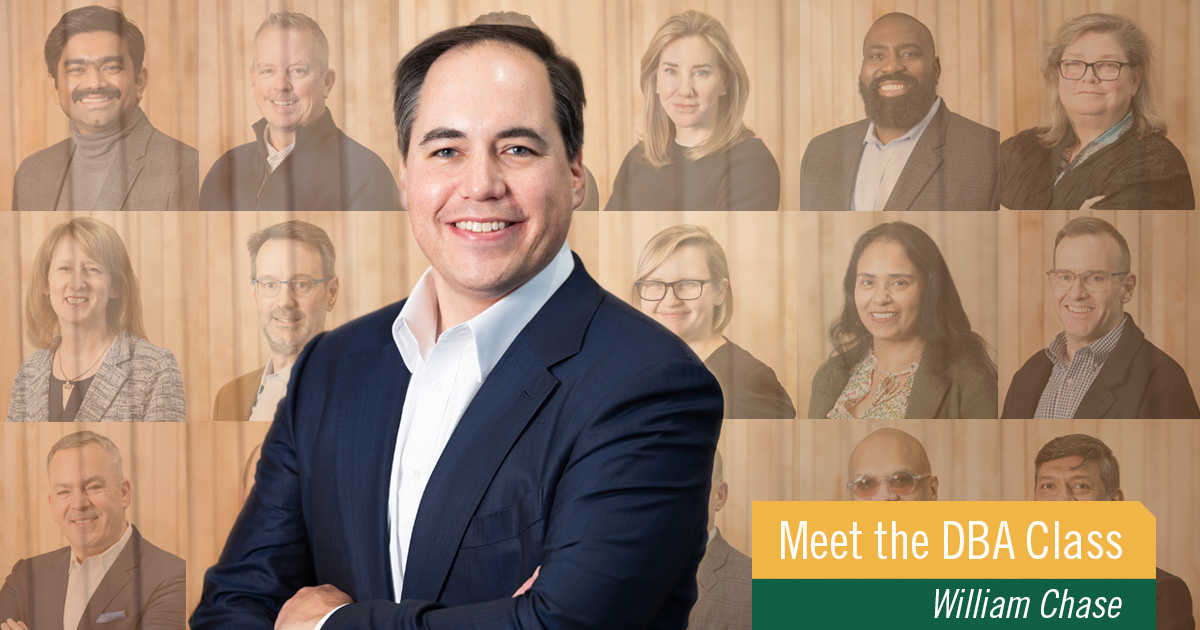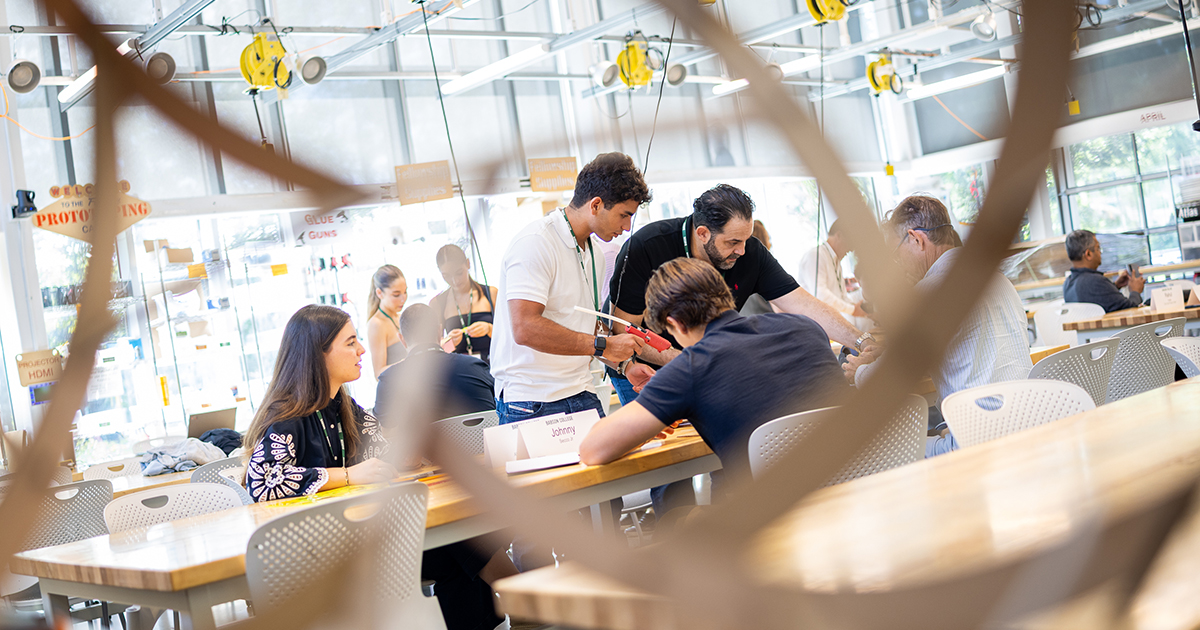Under a Big Sky, Entrepreneurial Leaders Focus on Their Promise
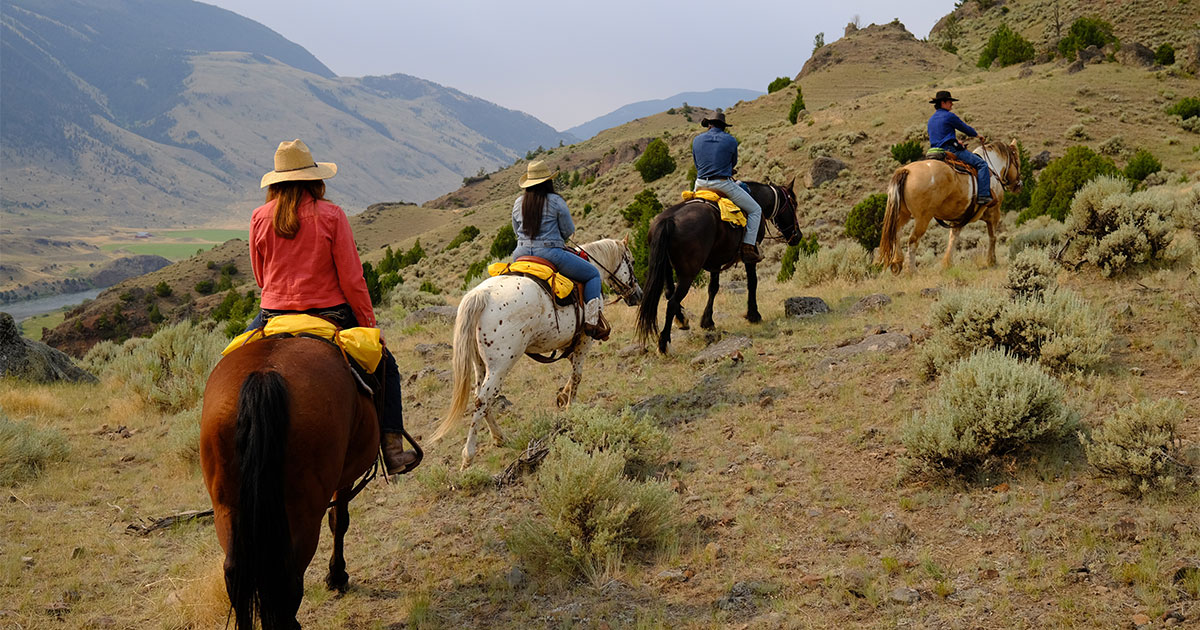
Like so many of us, Shannon Stober has felt tired and worn out by the lingering pandemic. “I know I’m not alone when I say that I have felt fragile, raw, and exhausted for more than a year,” she says.
This past summer, she received a welcome respite when she was invited to participate in a Babson College executive certificate program at Montana’s West Creek Ranch. Located 22 miles from Yellowstone National Park, the 6,600-acre working ranch is owned by The Arthur M. Blank Family Foundation and serves as a retreat space for leaders of companies and nonprofits.
At the ranch, Stober rode horses every day, surrounded by hills, sky, and openness. “While I was at the ranch, time stopped,” she says. “I was entirely inaccessible to the outside world and unbothered by the day to day.”
That peace allowed her to digest and reflect on the Babson program’s curriculum, which promised to leave a lasting impact on her career. In her native Montana, Stober wears a number of hats, including working as a consultant, being a board member of the Montana Higher Education Student Assistance Corporation, and serving as senior program director for Eagle Mount Bozeman, an organization providing recreational opportunities for people with disabilities and cancer.
Offered by Babson’s Arthur M. Blank School for Entrepreneurial Leadership, the Entrepreneurial Leadership in the Social Sector certificate program aims to empower entrepreneurial leaders such as Stober to develop real-world solutions to important social issues. It is a program built on reflection, camaraderie, and creativity, and in our uncertain and challenging moment in time, Stober found it rejuvenating, both professionally and personally.
“The curriculum was powerful because of its simplicity and truth,” she says. “Being in the position to reconnect to the simple truths of my work, as well as the simple truths of myself, has, in many ways, brought me back to life.”
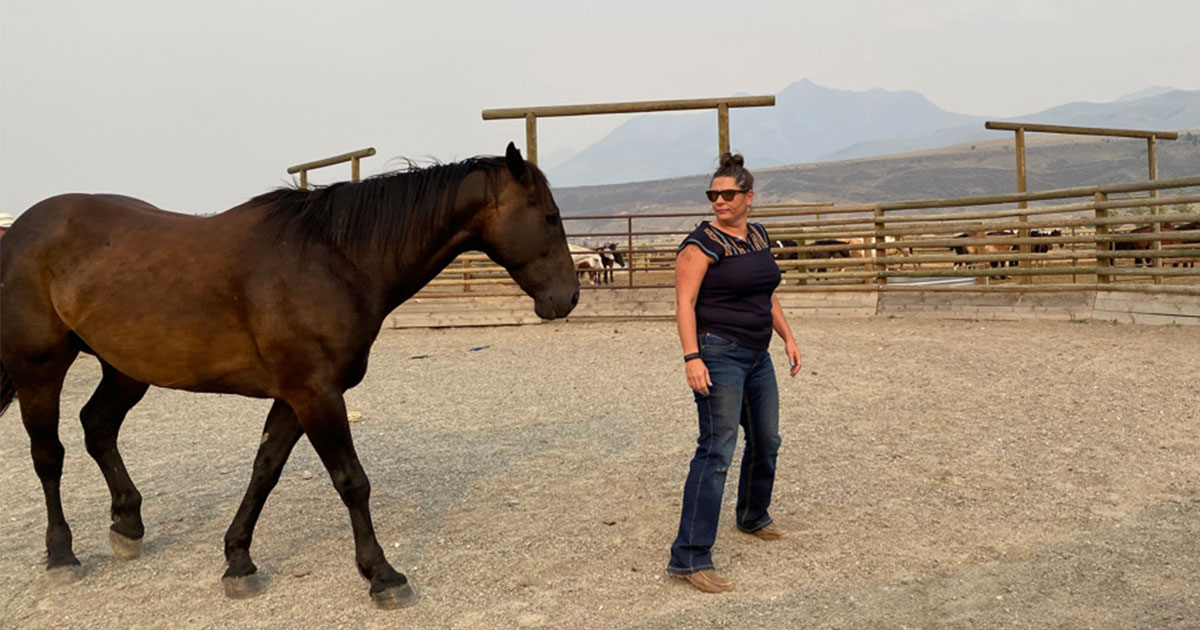
Shannon Stober, one of the participants in the Entrepreneurial Leadership in the Social Sector program, works with a horse as part of a workshop on communication.
‘What Is Your Promise?’
The social sector, which tries to address so many complex issues in our society, is in need of a new way of thinking, says Cheryl Kiser, the leader of the Babson program at the West Creek Ranch. “They are trying to solve big problems,” says Kiser, also executive director of Babson’s Lewis Institute for Social Innovation. “It is the one sector where we need to be innovative.”
Social organizations are often too dependent on philanthropy, which can be fickle, and fixate on the resources they don’t have. “It’s a mindset of scarcity,” Kiser says. “They never have enough money or enough resources.”
Kiser tasks participants in the West Creek program to focus on the specific ways they want to impact people and communities. “We don’t share mission or vision. That’s a litany of terms that are usually broad and nonspecific,” Kiser says. “We ask, what is your promise? A promise is what you are promising and guaranteeing you are going to do.” To achieve those promises, she wants participants to come away with an entrepreneurial mindset, one built on optimism and action that allows them to make the best use of the resources they have at hand.
“The curriculum was powerful because of its simplicity and truth. Being in the position to reconnect to the simple truths of my work, as well as the simple truths of myself, has, in many ways, brought me back to life.”
Shannon Stober, consultant and board member of the Montana Higher Education Student Assistance Corporation
Jennifer Owens appreciated this focus on the promise of an organization. The president and CEO of HealthMPowers, a nonprofit aiming to help children live healthier lives through nutrition and exercise, attended the program this past summer.
“I loved thinking about the difference between our mission and our promise to those we serve alongside,” Owens says. “In our work, we are focused on students, and yet we haven’t done a great job centering their voices in our decision making or even our strategy. My time at West Creek reaffirmed that we have to seek youth voice and leadership out more regularly and intentionally.”
The ranch setting only added to that reflection and re-evaluation. “It was as beautiful as I had imagined,” Owens says. “I am a Georgia girl through and through, so the wide-open spaces, mountains, and cool air in the middle of the summer were so different and magical.”
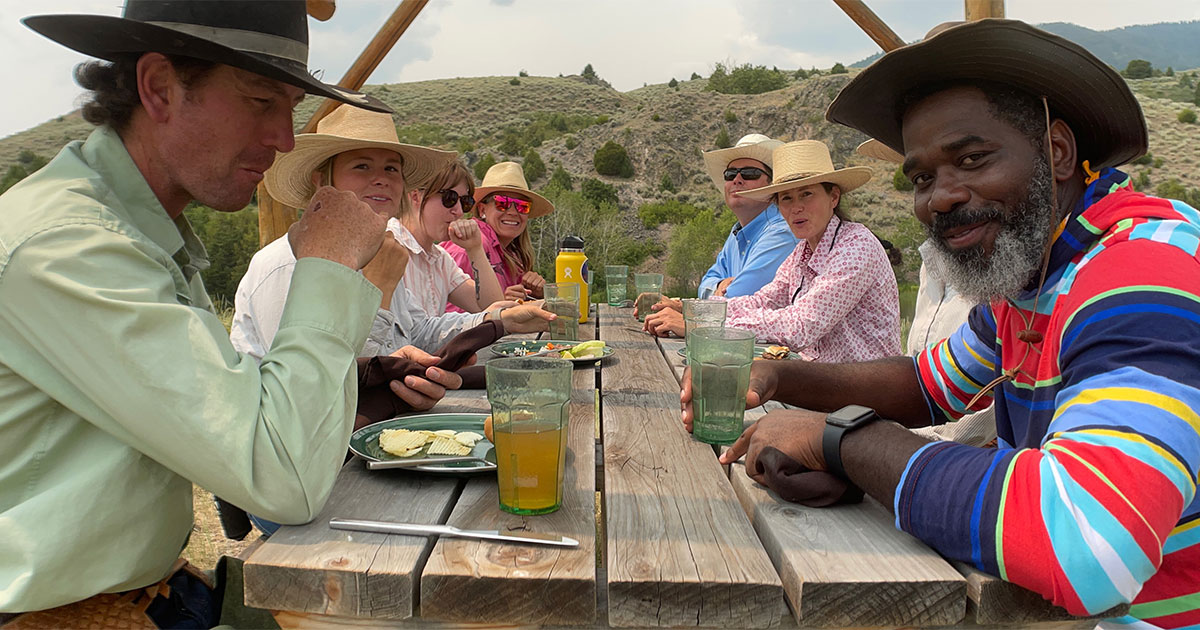
Gathering for outside activities, under Montana’s beautiful big sky, is a central part of life at West Creek Ranch.
The Space to Breathe
For other recent attendees, the Babson program provided an invaluable space for brainstorming and thinking. “The moment I arrived at the ranch I felt lighter,” says Michael Anthony, the CEO of GratitudeAmerica, which provides restorative programs to veterans and first responders. “I work countless hours with little time off, and this purposeful opportunity gave me time as a leader to breathe and focus on the most important tasks that are often pushed to the back burner.”
As Anthony was at the ranch, the United States’ 20-year military involvement in Afghanistan was coming to a chaotic end, and Anthony took the time to think about what that would mean for his organization and its work with veterans. “With the shift in U.S. policy, I had the space to really think about the long-term effects of this policy decision and devised a new way forward for GratitudeAmerica,” he says.
“We need all the collaboration and support we can get to push one another to try, fail, and get better in service of something so much bigger than ourselves and our individual organizations.”
Jennifer Owens, president and CEO of HealthMPowers
The program left Shun Tucker-Allen as committed as ever to perform outreach to the communities she works with. She is the senior faith coordinator at Fair Count, which works to increase civic engagement in disenfranchised communities.
Those communities, Tucker-Allen says, are often distrustful of outside organizations, who may promise to offer help but then never deliver. She says she’s inspired by the actions of West Creek owner Arthur Blank ’63, H’98. The owner of the NFL’s Atlanta Falcons, Blank made sure to listen to the concerns of the neighborhoods that would be affected when he built a new stadium for the team.
Tucker-Allen has family in those neighborhoods, and she knows how overlooked they often feel. “I understand the promises broken in those neighborhoods,” she says. Taking the time to listen and learn about communities is what Fair Count aims to do. “It’s about fostering a sense of trust,” she says. “We are committed to long-term engagement.”
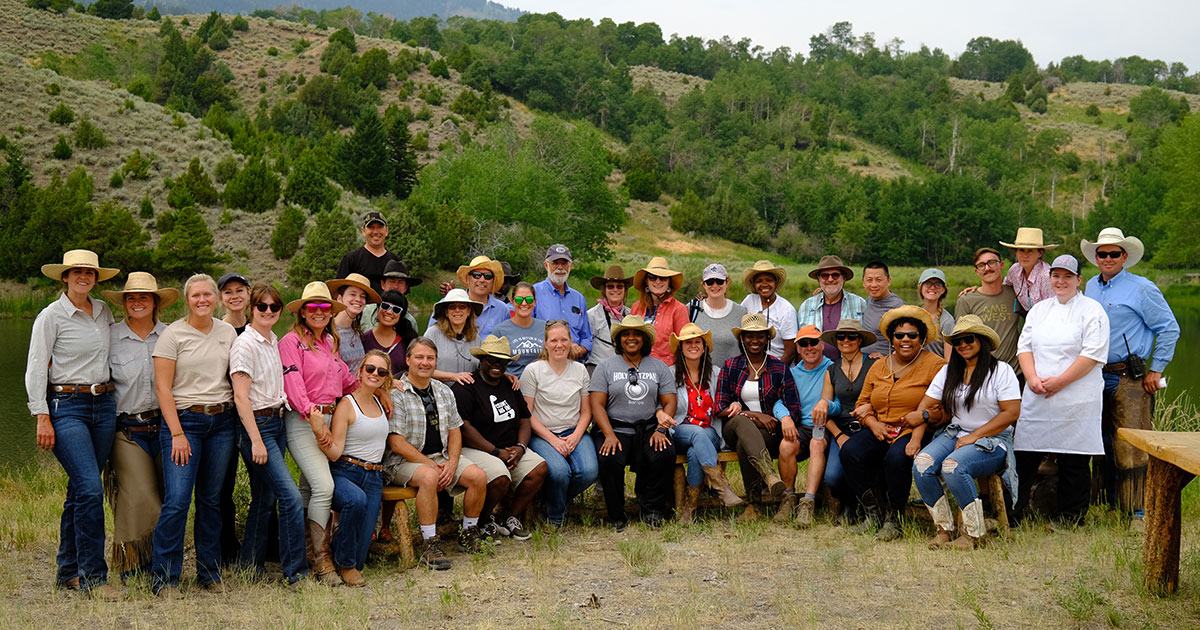
The certificate program allows leaders of social organizations to connect with each other for ideas and inspiration.
Much Bigger Than Ourselves
For the participants, the program also was invaluable in that it allowed them to connect with other social organizations. The job of trying to make the world a better place is a complicated one, and they were able to learn from each other. “We need all the collaboration and support we can get,” Owens says, “to push one another to try, fail, and get better in service of something so much bigger than ourselves and our individual organizations.”
After talking at West Creek about the trauma veterans struggle with, Anthony was asked by another organization at the ranch to speak at a forum targeting Latinos, an audience he doesn’t often reach. “As a veteran organization leader,” he says, “I tend to spend my days with veterans and other leaders with the same mindset.”
Jeanine Abrams McLean, president at Fair Count, was inspired by the many plans that organizations came up with during the program. “They were very direct, very specific ideas,” she says. “Listening to them, I thought, oh, that’s something we can try.”

West Creek Ranch is bordered by the Yellowstone River and Gallatin National Forest. “It was as beautiful as I had imagined,” says program participant Jennifer Owens.

